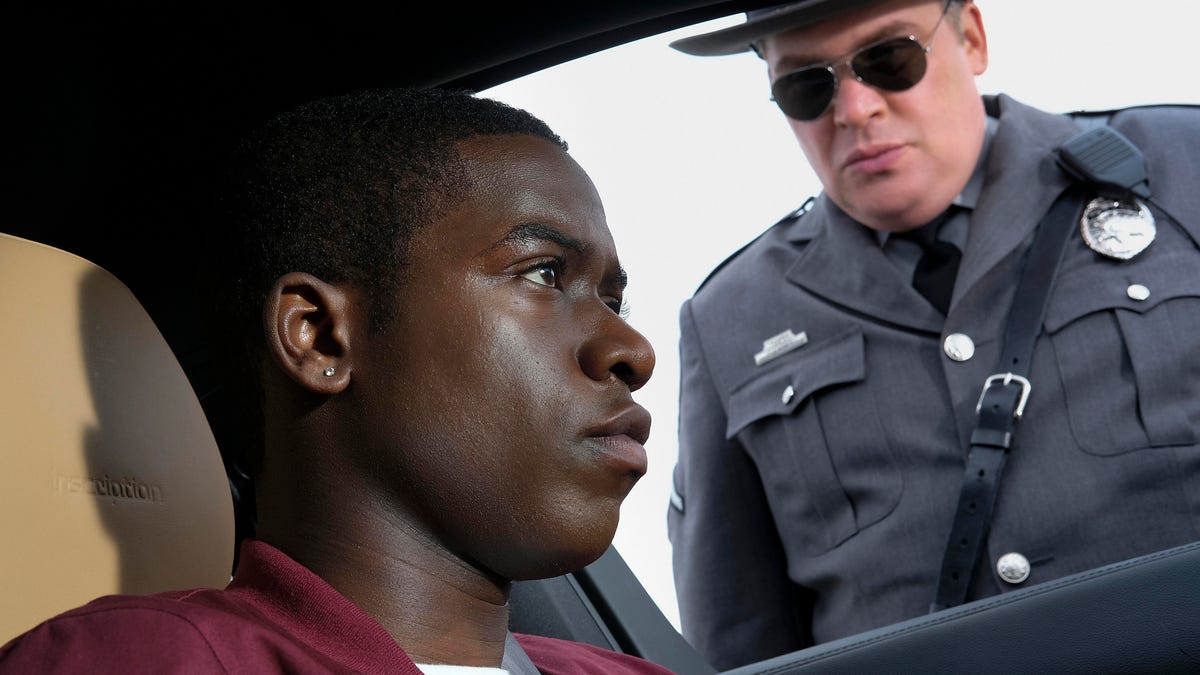The Twilight Zone takes aim at police shootings: 'This is urgent'
Selwyn Seyfu Hinds, who wrote the episode Replay, talks about putting a fantasy spin on this twisted but all-too-real tale of the black experience.

Ever watch the news and get the feeling you've seen it before? That's what inspired Replay, the latest episode of The Twilight Zone, which takes aim at racism and police shootings. It's a fantasy story, but it's all too real.
Replay is one of two new installments of the rebooted Twilight Zone available to stream starting Thursday, April 11 on CBS All Access. (Disclosure: CBS is CNET's parent company)
In the episode, a black single mother proudly accompanying her son to college discovers her battered camcorder has the power to rewind time. But even that mysterious power may not be enough to prevent tragedy at the hands of a racist white cop. The concept of time repeating itself is familiar from stories like Groundhog Day and Russian Doll, but here it's used to illustrate the implacable cycle of violence facing African Americans.
The episode's writer, Selwyn Seyfu Hinds, was drawn to this familiar trope when he set out to tackle how police interactions with people of color so often end in tragedy. Hinds watched video after video of encounters between the police and young black men like Philando Castile, Michael Brown, Tamir Rice, Eric Garner -- the list of names goes on.
"It was a really numbing and horrifying exercise," Hinds told me on the phone from LA, "and as I watched I got that feeling of time being rewound again and again."
Replay was born.
Sanaa Lathan has a magical camcorder but no magic solutions in the Twilight Zone episode Replay.
Science fiction and fantasy have long tackled racism and oppression. But whether it's mutants in the X-Men stories or alien races in Star Trek and Doctor Who, these themes have usually been couched in metaphorical conflict between fantasy figures. As a black character put it in a famous 1970 Green Lantern comic, "On a planet someplace you helped out the orange skins, and you done considerable for the purple skins! Only there's skins you never bothered with -- the black skins! How come?!"
The makers of Replay aren't interested in dancing around the subject of police brutality. "Right now I could hang up my phone and walk outside in the streets of Los Angeles and find myself in that situation," says Hinds, himself a person of color. "This is urgent. This is something as a nation we ignore, this horror, and in our own little way I wanted to take a sledgehammer to it."
Direct as it is, the episode does strike a balance between tragedy and hope for the future. The young man heading to college, played by Damson Idris, is a filmmaker aspiring to be the next Ryan Coogler -- the director behind Creed and Oscar-winning hit Black Panther. Hinds sees Marvel's black-led Afrofuturist phenomenon as something close to a big bang moment in culture -- along with Peele's hit horror movie Get Out, of course.
"There's a moment in Hollywood where our voice is coming to prominence," says Hinds, who is from New York via Guyana. "Doors are open in a way that they might not have been before." Hinds can't talk much about his upcoming projects, but he is working on adapting Nnedi Okorafor's Afrofuturist novel Who Fears Death for an HBO series produced by Game of Thrones author George R.R. Martin.
Jordan Peele, mastermind of the new Twilight Zone, Get Out and Us.
Hinds also highlights Twilight Zone mastermind Jordan Peele, fresh off the success of Us, as a key player. "Part two of that answer is that there's just no one like Jordan Peele in the landscape right now," Hinds says. "He has an energy, agenda and genius to take things to a higher level."
That said, Hinds praises Peele's hands-off approach while creating Replay. "He was always really respectful," Hinds says, "and he didn't want to 'put his fingerprints all over the episode,' as he called it."
Peele did make one suggestion that elevates Replay "from a pretty decent piece of television to something very special." While Hinds won't say exactly what Peele's contribution was, he does say the episode's final moments bear those Peele fingerprints.
The show is famous for gut-punch twist endings, which means even in its hopes and aspirations, Replay is still haunted by the specter of violence.
"There are some monsters that go from awake to semi-dormant, but we don't have the power to slay them right now," Hinds says. "And we didn't want to make something that was patently false ... There's no easy magical escape."

